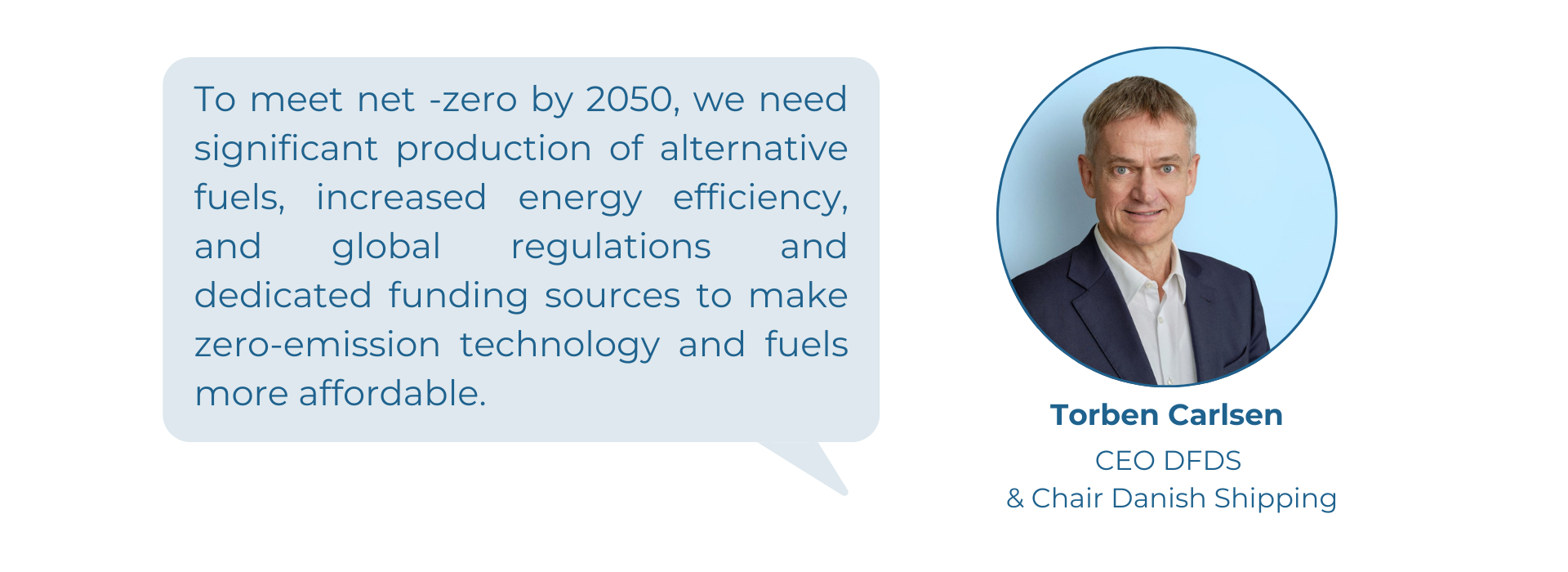Shipping People – Meet the European Shipowners
In the third edition of the interview series #ShippingPeople – meet the European Shipowners, we hand the microphone to Torben Carlsen, CEO of DFDS and Chair of Danish Shipping.
Meet Torben Carlsen, DFDS CEO, Chair of Danish Shipping and member of the ECSA Board. Torben joined DFDS in 2009 as EVP & CFO and took over the helm as President & CEO in 2019. Before this he held several positions in private equity and business related to the airline industry.

Considering Europe’s goal to meet climate neutrality by 2050, which are the main challenges for shipping? What innovative technologies or alternative fuels do you see as solutions to reduce emissions and achieve the climate targets?
One of the main challenges for shipping in achieving net-zero by 2050 is the lack of zero-emission fuels. To meet this goal, we need significant production of alternative fuels, increased energy efficiency, and global regulations and dedicated funding sources to make zero-emission technology and fuels more affordable. We need to bridge the gap between the cost of fossil and zero-emission fuels in an intelligent and efficient manner.
A mix of solutions, including e-methanol, ammonia, and electrification, will likely be needed, but large investments and collaboration across all sectors including governments, authorities, organisations, energy producers and companies are essential.
The European shipping fleet is one of the largest in the world, enabling the EU to play a leading role in the global supply chains. How do you perceive the strategic role of shipping for European security?
The Covid-19 pandemic highlighted the strategic importance of a strong European shipping fleet, which is crucial for supply chain security in a volatile world. Free and uninterrupted trade is vital for food, energy and supply chain stability. Additionally arobust European shipping sector plays a key role in advancing green initiatives and enhancing long-term security by combating climate change through international cooperation.
Especially in the IMO, where European and other likeminded countries can work together to further the green transition and combat climate change. Maintaining dialogue within the European shipping community is essential for addressing important issues collaboratively and a key role for ECSA.
Diversity brings unique skills, increases innovation and fosters a more inclusive working environment. What could the industry do to increase diversity and bring opportunities for women and underrepresented groups in shipping?
Shipping has traditionally lacked diversity, but this needs to change. Diversity, Equity, and Inclusion (DEI) should be a strategic priority for any company aiming for success. At my own company, DFDS, we have a continued strategic focus on ensuring accountability among managers, integrating DE&I into our business processes and our constant awareness through communications, training and events. Managers are expected to lead by example, supported by HR. This approach improves performance, attracts top talent, and fosters an inclusive culture, both onboard ships and throughout the industry. Change starts at the top.
The interview with Torben Carlsen is the third in the series. Find previous versions below.
For press and media enquiries, please contact:
Luisa Puccio, luisa.puccio@ecsa.eu, +32 492 733623

